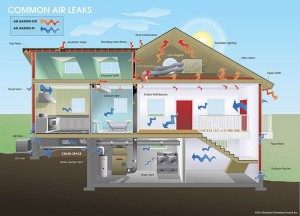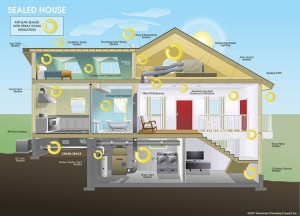Why is my house always hot/cold?
Not all insulation is created EQUAL!
Highest effective R-Value, and reduces energy consumption up to 50%
- Provides a seamless air barrier that eliminates air transfer convective heat loss through celings and walls
- Seals all nooks and crannies
- Dramatically improves air quality
- Restricts moisture transmission and virtually eliminates moisture and mold problems within wall cavities
- Adds structural strength and stability (Closed Cell Foam)
- Reduces sound transmission
- Does not shrink or settle
- Environmentally friendly
Common Air Leaks
Sealed House
If you spray the underside of a roof deck with Spray Foam Insulation, should you vent the attic?
No, the application of Spray Foam Insulation to the underside of the roof deck minimizes the potential for condensation. The Spray Foam Insulation develops a thermal and moisture gradient that avoids the development of dew point conditions in the attic. Because of this, moisture won’t condense or accumulate, and therefore does not need to be vented to the exterior.
How does Spray Foam reduce energy usage in residential occupancies and buildings?
- SPF provides a continuous air barrier
- SPF prevents moisture infiltration through air leakage
- SPF minimizes dew point problems and condensation
- SPF avoids thermal bridging
- SPF resists heat movement in all directions
- SPF provides reliable performance under varying conditions
- Studies have shown that as much as 40% of a building’s total energy loss is due to air infiltration. Traditional fiberglass insulation is only stapled, or placed into the wall cavities and does not seal the stud and wall cavities from end to end, or top to bottom. Air infiltration can pass through these gaps, making it far less efficient than SPF. SPF not only adheres to, but forms to the walls and floors to create a tight seal and insulating barrier that stops this air leakage. SPF also boasts the highest R-value per inch than any other commercial material, (upwards of R-7.0, compared with Fiberglass at R-3.5) making your home more comfortable and less expensive to heat in the winter, and cool in the summer.
What is an R-Value?
R-Value is a measure of thermal resistance used in the building and construction industry. Sprayed polyurethane foam has an aged R-value of up to 7.0 per 1 inch thickness (depending on the particular formulation and application, higher values have been achieved), enabling it to provide more thermal resistance with less material than any other type of commercial insulation material. SPF systems are frequently used to insulate and protect a wide variety of residential, commercial, and industrial buildings. Monthly energy and utility savings of 30% or greater can be achieved when compared to the alternative roofing and insulation systems. The cost of an SPF roof or insulation system can often be recovered in less than 5 years, simply through energy savings alone.
Call Or e-mail: info@airtightofnewyork.com For More Info & A Free Estimate Today!


